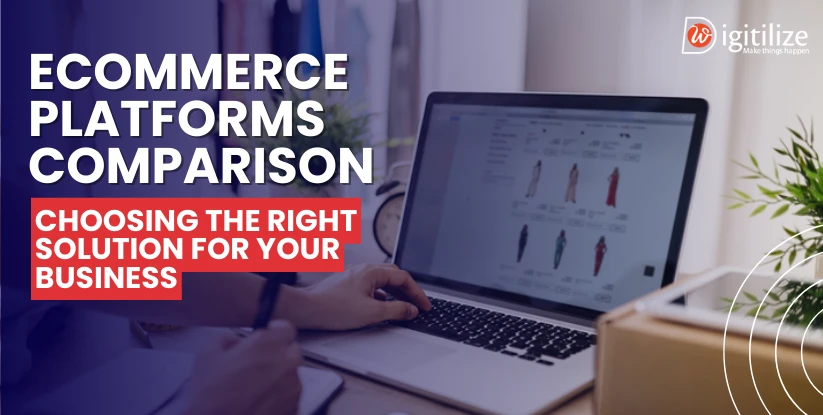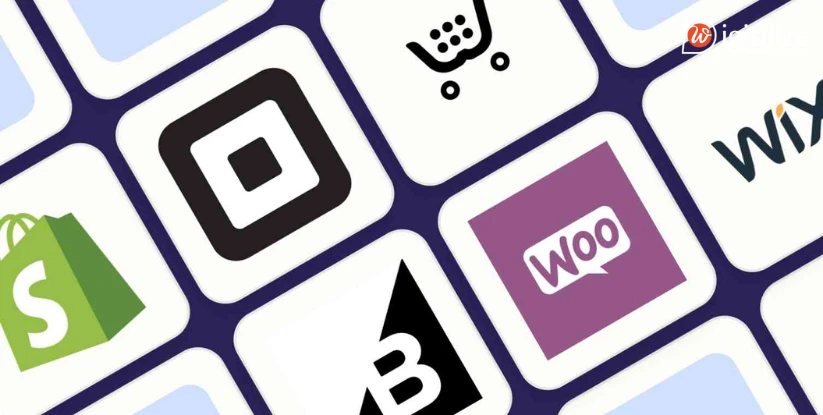Ecommerce Platforms Comparison: Choosing the Right Solution for Your Business
 Are you considering launching an ecommerce or switching to a new platform for your current online store? If so, one of the most crucial choices you will make as a business owner is selecting the best ecommerce platform for your enterprise. For this, we need to know the best ecommerce platforms 2024 Magento vs BigCommerce features: choosing the right solution for your business.
When it comes to ecommerce platforms, there are several options available. So, they can be so similar that it can be challenging to tell them apart. The fundamental features that you demonstrate will be offered by all online stores. Hence, many others offer further levels of functionality for online product sales, which you may or may not need for your business.
To assist you in sorting through the clutter and choosing the best platform for your company. To assist you in making an educated choice, we have evaluated the main ecommerce platforms, examining the salient characteristics, advantages, and disadvantages of each platform.
Are you considering launching an ecommerce or switching to a new platform for your current online store? If so, one of the most crucial choices you will make as a business owner is selecting the best ecommerce platform for your enterprise. For this, we need to know the best ecommerce platforms 2024 Magento vs BigCommerce features: choosing the right solution for your business.
When it comes to ecommerce platforms, there are several options available. So, they can be so similar that it can be challenging to tell them apart. The fundamental features that you demonstrate will be offered by all online stores. Hence, many others offer further levels of functionality for online product sales, which you may or may not need for your business.
To assist you in sorting through the clutter and choosing the best platform for your company. To assist you in making an educated choice, we have evaluated the main ecommerce platforms, examining the salient characteristics, advantages, and disadvantages of each platform.
What makes a good ecommerce platform?
An outstanding user experience may be achieved by combining a variety of features and aspects on an ecommerce website. So, an experience that smoothly takes your consumers on a journey from discovery, and appraisal to purchase without interruptions. In essence, you want to deliver an experience that entices them to come back and recommend you to their friends and family. Therefore, this is a summary of some of the most important elements that go into creating effective eCommerce experiences. A decent ecommerce platform should include a few essential components, which will depend on your company’s size, kind, and sector. Among them are:- Being able to personalise your shop
- Simple payment processing, either in-person or via a third-party
- Adaptability to mobile devices
- Usability in terms of tracking and delivery
- The ability to scale
- Seamless Checkouts
The Best Ecommerce Platforms

Woocommerce
In that it is a plugin rather than a whole ecommerce platform, WooCommerce differs somewhat from the other solutions in this article. So, WooCommerce is incredibly well-liked and a fantastic choice for companies who use WordPress for their website.Pros
- Free platform with a large selection of free plugins and themes
- Totally adaptable
- No restrictions on the quantity of goods or orders you can sell
- Dependable and safe
- Search engine friendly
Cons
- Technical proficiency required
- Scaling may be challenging.
- Cover the cost of your own hosting
- Payment gateway from a third party is necessary.
Shopify
This demonstrates how user-friendly this cloud-hosted product is. The SaaS platform is easy to plug and play, allowing a store to be up and operating in a matter of hours. So, Shopify facilitates growth and scaling with an extensive app market full of plugins and a wide selection of cutting-edge solutions. Shopify Plus, the company version, offers additional staff accounts, reduced transaction costs, and increased customisation.Pros
- There’s a free trial available to get you started.
- A wide variety of topics are offered
- Vast selection of plugins available
- Every plan offers an infinite number of items.
- Integrated methods of payment
Cons
- Fees may mount up rapidly.
- The blogging platform is basic.
Squarespace
Regarding the global top platforms for online stores market share, Squarespace, a supplier of SaaS website platforms, comes in second. Moreover, designing a visually striking storefront is made simple with SquareSpace, the platform of choice for creatives. with a variety of elegant, contemporary layouts and the flexibility to regularly alter the look and feel of your shop. A cost-effective option for branded web retailers is Squarespace.Pros
- A choice of attractive templates to pick from
- Plans that are inexpensive and economical
- round-the-clock assistance
- Simple yet very good SSL security for social media integration
- Free domain with a yearly subscription
Cons
- Not a free scheme
- Challenging to personalise
- Comparatively high transaction costs
- Clients can only make payments to the business via Stripe, Apple Pay, or PayPal.
- Not a market for apps
Wix
Wix is popular for similar features to Squarespace: an easy-to-use drag-and-drop interface, eye-catching modern themes (both free and premium), and reasonably priced prices. So, it is favoured by entrepreneurs and small company owners, catering to all skill levels with the shared goal of providing an innovative and valuable user experience. Hence, the SaaS platform is the best option for setting up a store fast and simply since it offers hundreds of templates, a variety of payment options, and secure check-out.Pros
- Many lovely themes for PC and mobile
- A lot of plugins and applications for the user experience
- Several safe ways for your clients to make payments
- Cost-effective
Cons
- Not open-source, which restricts the addition of features and functionality
- Limited eCommerce features include the inability to export items, change templates, support for AMP, and genuine multi-currency.
- No export of data.
BigCommerce
BigCommerce is ideal for businesses looking to launch swiftly, expand steadily, and minimise setup costs. So, this open SaaS platform and headless commerce supplier is a clever, scalable online sales solution if you’re organising an omnichannel commerce experience. So, the majority of the functionality you’ll want is already included in the programme thanks to its extensive feature set. Moreover, you will, however, want the assistance of knowledgeable developers to fully benefit from it all.Pros
- A vast collection of editable templates, together with assistance with setup and migration.
- Robust choice for cross-channel and various selling.
- Potent business capabilities, including inventory management, custom orders, offline commerce connectivity, catalog migrations, visual merchandising tools, and CRM tools.
- Helpful customer service, unlimited staff accounts.
- No costs for transactions.
- Products, storage, and bandwidth are all unlimited.
- Options for reviewing and rating products.
Cons
- Its sophisticated features and usefulness make it difficult to operate.
- The price is a little unclear.
- Limited options for free themes۔
- Setup may be difficult.
Magento
For companies who either deal with external development teams or have in-house IT departments. So, it wants to offer unique eCommerce experiences, Magento is the best open-source option. If creating an omnichannel experience is your aim, Magento gives your developers the tools they need to design a solid, personalised experience for every platform. Hence, small and startup firms with an IT staff, as well as mid-sized corporations, can benefit greatly from this solution.Pros
- The programme is available for free.
- Customising your experience is simple and adaptable thanks to open source.
- Large group of skilled Magento developers (3,000,000+)
- Worldwide resolution
- Vibrant, extensive Magento marketplace
Cons
- To design a special and exquisite personalised experience, for that needs a developer.
- Challenging to use
- Setup may be expensive.
- Your hosting and payment gateways need to be managed.
How To Pick Your Company’s Best Ecommerce Platform in 2024

-
Determine the Platform’s Cost
-
Make Sure It Facilitates an Excellent Shipping Experience
-
Determine Its Security
-
Appropriate for Search Engine Marketing
-
Make Sure It Adapts to Mobile
-
Platform and Hosting Ownership
FAQ
Frequently Asked Questions
Indeed, there are free ecommerce systems available, such as OpenCart and WooCommerce (which require WordPress). Though some platforms offer some basic functionality, bear in mind that you may need to purchase extensions or plugins in order to get more features and support.
Absolutely, you may migrate to other ecommerce platforms from most of them. To prevent data loss and a decline in search engine rankings, the procedure can be intricate and needs careful planning.
WooCommerce is a plugin rather than a standalone platform, designed for businesses using WordPress. It offers a large selection of free plugins and themes, is adaptable, and has no restrictions on the quantity of goods or orders. However, technical proficiency is required.
Shopify is known for its user-friendly, cloud-hosted platform. It allows for quick setup and operation, offers a variety of themes and plugins, and supports an infinite number of items. However, fees can accumulate rapidly, and the blogging platform is basic.
Magento is an open-source option for businesses with external development teams or in-house IT departments. It allows for unique ecommerce experiences and is suitable for small to mid-sized companies wanting to create an omnichannel experience. However, it can be challenging to use and set up.
Considerations include the platform's cost, shipping experience, security, search engine marketing compatibility, mobile adaptability, and whether it's cloud-hosted or self-hosted. The choice should align with your business's needs in terms of price, customization, security, and scalability.

